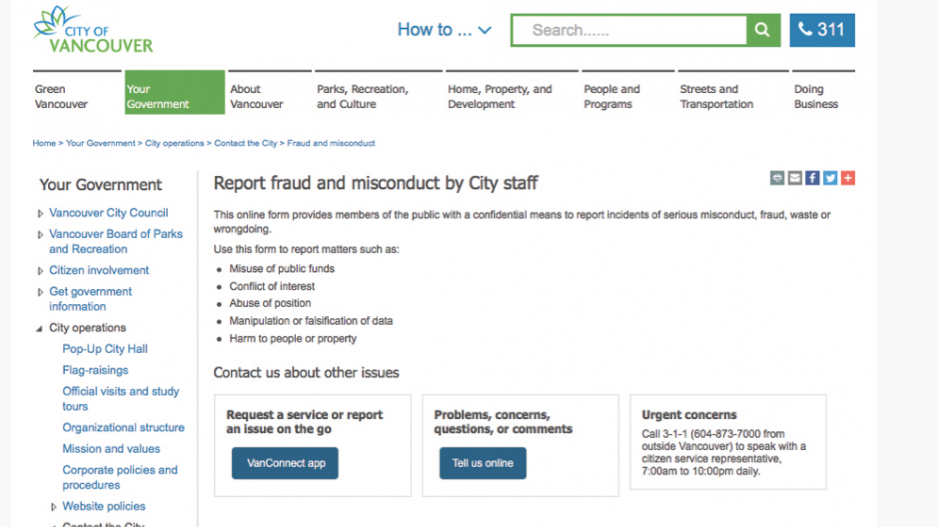How serious is Vancouver city hall in stamping out fraud and waste? It is hard to tell, because the details of nearly 60 complaints over a 10-month period are secret.
Last fall, the city published a form on its website for members of the public to confidentially report incidents of serious misconduct, fraud, waste or wrongdoing.
A spreadsheet obtained under freedom of information (FOI) by Business in Vancouver shows 57 reports were received in the period of November 4, 2015 to September 19, 2016. February 2016 was the most-active month with 12.
The dates and outcomes are visible. Some of the cases were sent to various identified and unidentified departments for follow-up or inspection.
The actual complaints were censored because the city believes disclosure would be an unreasonable invasion of privacy – even though the website says only complainants’ names will not be supplied to FOI requesters.
A May 29 entry mentions a complaint about parking decals used by Vancouver police, while an August 4 entry referred to an unnamed person who owned four properties and may have been receiving homeowner grants. In both cases, it did not appear irregularities were detected. Ten entries said no action was required. Only three of the cases were listed as “in progress.”
“Seems like a great idea in theory, but practically, is it going to get people to come forward?” said Vancouver lawyer Nathalie Baker, a specialist in municipal law with Stevens Virgin.
The website doesn’t spell out who the reports are going to. Baker said it is odd the city would not disclose the nature of complaints.
“It seems surprising that under FOI you’d get so little; a blanket deletion like this,” Baker said.
The city’s staff whistleblowing policy dates back to 2008 and outlines the steps in mandatory reporting and investigation of fraud, theft, embezzlement, kickbacks or bribes, and manipulating city accounts or records. Baker said Vancouver should look east to Toronto for advice. Unlike Vancouver, Toronto has a whistleblowing bylaw and an independent integrity commissioner.
Toronto’s Fraud and Waste Hotline is operated by the forensic unit of the city’s Auditor General – and former assistant B.C. auditor general – Beverly Romeo-Beehler.
The program’s annual report stated 572 complaints and 800 allegations were received in 2015. Preliminary investigations were conducted for 85% of the complaints. A quarter of complaints were substantiated.
“Substantiated complaint trends include conflicts of interest (e.g. employees with second jobs), time theft and subsidy fraud,” the report said. “Losses associated with the 2015 complaints total approximately $209,000 (actual) and $77,000 (potential loss) had the fraud not been detected.”
In one 2015 incident, $5.1 million in potential exposure was identified. Actual and potential losses varied annually. For the last five years, there were $7.4 million actual and potential losses and $1.5 million recovered.
Vision Vancouver, in power since 2008, has resisted calls by the opposition Non-Partisan Association to set up a civic auditor general. City hall’s five-person, internal audit department is not independent, as it falls within the office of the city manager. For instance, a 2015 internal audit department report revealed there were no criteria for vendor checks and procurement staff lacked knowledge of the conflict of interest policy. However, the report stated the audit was “not designed to detect fraud.”
Nearly two years ago, deputy Vancouver chief building official Carli Edwards quit when it was found she failed to take out a renovation permit for her house. Penny Ballem, who was city manager at the time, said the investigation stemmed from a whistleblower’s complaint. Edwards had no history of misconduct and received six months severance and outplacement assistance. She was appointed City of Richmond’s chief licensing inspector last February.
The biggest recent case of municipal corruption in the region involved City of Surrey planner Akonyu Akolo. He was sentenced to 15 months of conditional house arrest in early 2014 after pleading guilty to breach of trust by a public official. He had been accused of taking bribes. •




